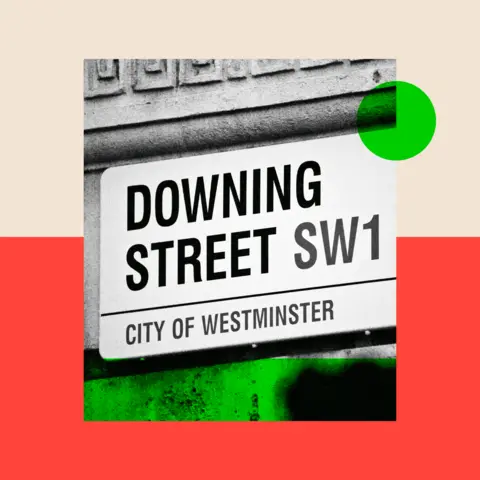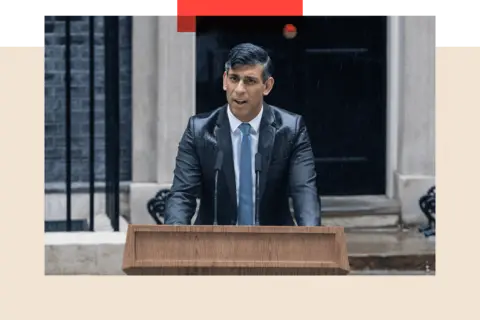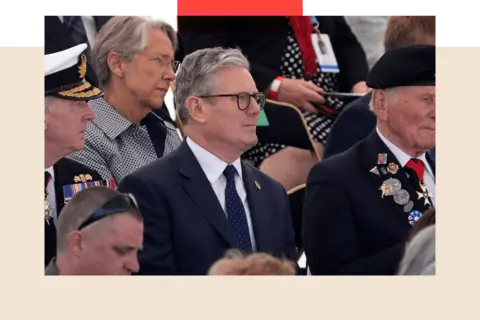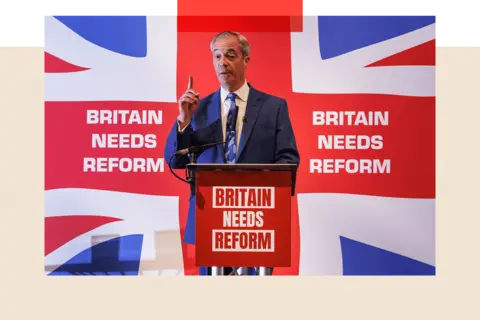ARTICLE AD BOX


17 minutes ago
By Laura Kuenssberg, @bbclaurak,
Sunday with Laura Kuenssberg

 Getty Images
Getty Images
Nearly there!
The battle buses have revved up for their final journeys. The set piece debates are all over. The parties’ manifestos almost seem like a distant memory.
It’s five days until polling day and this time next week, on Saturday 6 July, you can expect the occupant of Number 10 to be gathering together their cabinet.
Time to take stock then of the state of play after five frantic weeks.
The Conservatives have not managed to narrow the gap between them and Labour which, for months, was their hope and expectation.
Their campaign has been defined by mishaps and mistakes, from its sodden start, to the PM's early D-day departure, to another Westminster saga, where some Tories were alleged to have bet on the date of the election, and are being looked at by the Gambling Commission.
Whether these changed voters minds or not remains to be seen, but each has added up to a sense that the campaign has been lacklustre and poorly run.

 Getty Images
Getty Images
Well-known cabinet ministers have been noticeably absent on the campaign trail - a mixture perhaps of running for the hills or scrambling for their own seats. One of their colleagues who has been showing up said “it’s been awful”.
In the last few days, Rishi Sunak seems to have suddenly found an injection of energy, emotion and resolve, with his performance at the TV debate and his visible anger about racist slurs about him apparently made by one of Reform's activists on Friday.
But what has really stumped some of his colleagues is that he had the advantage of knowing the election was coming. Yet it’s the Conservatives who have looked ill-prepared from the off.
“The element of surprise is what you are meant to do to your enemy, not yourself,” one former cabinet minister said.


Sign up for the Off Air with Laura K newsletter to get Laura Kuenssberg's expert insight and insider stories every week, emailed directly to you.


They have managed to apply some pressure to Labour, particularly on immigration, and tax, but looking at the last five weeks you might wonder, if the Conservatives can’t seem to run a smooth campaign how can they run the country?
For Labour the campaign has run more or less like clockwork. They didn’t have 4 July pencilled in as one of the possible dates for the poll but were long suspicious that the Tories would call a surprise spring election, so had spent months preparing.
There have certainly been mishaps. Back at the start, the party’s will-they-won’t-they let Diane Abbott back onto the green benches stirred up lots of party members, and looked clumsy.
Sir Keir Starmer’s backers had often claimed his willingness to cut out some on the left of the party as a badge of honour after all the angst during Jeremy Corbyn’s leadership.
But a boast of “changed Labour” didn’t include mistreating the party’s longest serving black female MP.

 Getty Images
Getty Images
And while the Conservatives haven’t managed to shift the polls, they have put Labour under pressure on their plans for tax, and tackling migration.
There have also been sticky moments when Sir Keir faced questions from the public - derision, even, when he was trying to justify being part of Corbyn’s team and awkwardness when answering questions on women’s rights.
Both of the main parties have been regularly reprimanded too by independent number crunchers for not being candid enough over the grim state of the public finances - the reality, the respected IFS and others calculate, is that there will be taxes or cuts on the way whoever is in charge.
Let’s be realistic: it's just not likely that any political party that seeks to govern after a few years of a cost of living crisis is going to stand up and say, "money is tight, by the way, there are more cuts on the way or you’ll have to pay more".
But there is deep scepticism, from the IFS and others, that either of the big parties’ sums really add up.




That’s been part of the ammunition some of the smaller parties have used to chuck at Sunak and Starmer.
The SNP, the Greens, and the Lib Dems - when their leader Ed Davey has not been on a water slide/paddleboard/waltzer or goodness knows what’s next (I’m assured there are more stunts to come) - have been the ones that have claimed all the way that Labour is heading to Number 10 and that they are the ones who can keep them honest, and prevent them just working from a Tory script.
The Greens are hopeful of bagging more seats after a couple of years of local election gains; the Lib Dems are sure they are going to make up a decent amount of ground too and hope to become the third biggest party in Parliament again. That would be at the expense of the SNP who, after huge turmoil, are trying to stop a slide.
My colleague Gareth Lewis explains here how Plaid Cymru might find winning their two target seats at this election tough; and in Northern Ireland, my colleague Jayne McCormack points out in our Election Essential newsletter that the tussle between unionist DUP and nationalist Sinn Féin to secure the most seats at Westminster shows no signs of abating.
She says that this year it is a contest being watched particularly closely because, for the first time since 2005, Sinn Féin looks as though it could outperform its rival. This would be a symbolic moment for Irish nationalism and Northern Ireland more generally.
But the small party that has made the most noise is Nigel Farage’s Reform UK. For weeks they’ve grabbed headlines for the wrong reasons: from a candidate who suggested the UK shouldn’t have fought World War Two, to misogynistic comments by eight candidates we revealed last week, to the horribly offensive racial slurs used by some activists, which exploded into a race row.
The Tories ran their campaign with the intent of defending their vote share from leaching to Reform. In the closing days, Reform UK is the party that’s been having to defend its values. It is likely they’ll still get a decent chunk of support that will slice away at the Conservatives’ vote. As at so many points in the party’s history, a Tory leader has had to grapple with how to manage pressure from the right of the conservative (with a small c) movement.
Even during the campaign we’ve seen Conservatives clash over whether Mr Farage himself could ever have a place in their party. He is set on causing disruption, as ever.
How much upset he actually causes, we’ll see.

 Getty Images
Getty Images
Before the campaign started there was a common expectation in Westminster circles that a campaign, where the principle actors were Rishi Sunak and Keir Starmer might be, well, not exactly a thriller.
In fact, from Sunak’s D-day disaster, Farage’s stormy entrance into the campaign, ‘gamblegate’ and in the closing moments, Rishi Sunak perhaps more personal than he’s ever been, it has been anything but dull.
But I can’t help wondering if it’s really a campaign where we have seen our politicians grapple with the massive issues that affect us.
In the first part of the year, politicians were fond of talking about the dangers the world faces, but they haven’t chosen to make much of foreign affairs. The challenges and opportunities of technology they often love to talk about have been more or less absent too. What about how we care for our vulnerable and elderly with social care?
What about what seems to be a crisis taking place behind closed doors in our prisons? Climate change? The true scale of the country’s debts and what that really might mean in the years to come?
Of course, politicians match their campaigns to what is top of voters’ lists.
Campaign in poetry, govern in prose?
Perhaps more like: campaign on a few core issues that appeal to focus groups, and worry about some of the massive issues of governing a bit later on.
It is nearly over. Our political parties have been doing their best, or what passes for it, for more than a month to get you to back them. We’re nearly at that magic moment where it’s all of us in charge, not the politicians.
It’s not likely that any of the 2024 campaigns will go down as the most inspiring, dynamic, memorable political operations. I’m not so sure that the public would have been in the mood to be romanced and dazzled by any of them anyway after all the stresses and strains of the last few years.
But that doesn’t make our decisions in the next week any less important. The choice will affect us all.
BBC InDepth is the new home on the website and app for the best analysis and expertise from our top journalists. Under a distinctive new brand, we’ll bring you fresh perspectives that challenge assumptions, and deep reporting on the biggest issues to help you make sense of a complex world. And we’ll be showcasing thought-provoking content from across BBC Sounds and iPlayer too. We’re starting small but thinking big, and we want to know what you think - you can send us your feedback by clicking on the button below.

 6 months ago
26
6 months ago
26








 English (US) ·
English (US) ·